Contents
- 1. Duties of Kshatriya class
- 2. Duties of Vaishya class
- 3. Spiritual practice of Vaishya class
- 4. Earning a livelihood by Vaishya class
- 5. Special features of Shudra class
- 6. Spiritual practice of Shudra class
- 7. Livelihood of Shudra class
1. Duties of Kshatriya class
Protecting the society from evildoers and governing the state righteously are the main duties of the Kshatriya.
2. Duties of Vaishya class
The Smrutis have not prescribed separate rules for the Vaishya and the Shudra with respect to actions necessary for them. The Vaishyas and Shudras had to change their duties towards the Brahmans depending on the circumstances.
A. Serving the society by rearing cattle, agriculture and trade.
B. Assisting the royal treasury so as to fortify the kingdom.
3. Spiritual practice of Vaishya class
3.1 Offering (dan)
A. Origin and meaning: The word dan (दान) meaning donation or offering has been derived from the verb da (दा) meaning to give.
1. According to the Nyayakosh: Giving an offering is a kind of sacrifice. Here man surrenders the ownership of a particular object or money and the recipient becomes the owner.
2. According to the Shabdakalpadrum: An offering is an object or money gifted with faith and respect, to a deserving person.
3. According to the Shandilyopanishad: An offering is gifting an object or money procured by righteous means to a deserving one, with faith and respect.
B. Importance of wealth
1. धननाशेऽधिकं दु:खं मन्ये सर्वमहत्तरम् ।
ज्ञातयो ह्यवमन्यन्ते मित्राणि च धनाच्च्युतम् ।। महाभारत १२.१७७.३४Meaning: (The renunciant Manki says) I feel that unhappiness caused by loss of wealth is very intense because even the kindred and friends insult its loser. – Mahabharat 12.177.34
2. अबलस्य कुत: कोशो ह्यकोशस्य कुतो बलम् ।
अबलस्य कुतो राज्यमराज्ञ: श्रीर्भवेत्कुत: ।। महाभारत १२.१३३.४Meaning: From where will the weak acquire wealth? And how will the unwealthy one acquire power? So also how will the kingdom of a powerless one survive? And if the kingdom is lost then how will its wealth remain? – Mahabharat 12.133.4
The significance of undertaking the spiritual practice of the Vaishya and the Kshatriya will become clearer from this verse (shloka).
3. धनात्कुलं प्रभवति धनाद्धर्म: प्रवर्धते ।
नाधनस्यास्त्ययं लोको न पर: पुरुषोत्तम ।। महाभारत १२.८.२२Meaning: (Arjun tells Yudhishthir) O great one, a family becomes powerful by means of wealth. Wealth facilitates a rise in Righteousness (Dharma). The poor are neither happy in this world nor in the other regions. – Mahabharat 12.8.22
4. न ह्यृतेऽर्थेन वर्तेते धर्मकामाविति श्रुति: ।। – महाभारत १२.१६७.१२
Meaning: There is a verse in the Vedas (Shrutis) that without wealth the other two pursuits of life viz. Righteousness (Dharma) and desire (kama) cannot exist. – Mahabharat 12.167.12
C. Attitude about accumulation of wealth: One should consider the wealth obtained as a blessing bestowed by The Lord.
D. Losses due to accumulation of wealth
1. दर्पो नाम श्रिय: पुत्रो जज्ञेऽधर्मादिति श्रुति: ।। – महाभारत १२.९०.२६
Meaning: It is said that pride (darpa) is a son born to deity Lakshmi from unrighteousness. – Mahabharat 12.90.26
2. न हि संचयवान्कश्चिद्दृश्यते निरुपद्रव: ।। – महाभारत ३.२.४८
Meaning: One does not come across a wealthy man who is without any troubles. – Mahabharat 3.2.48
3. अगोप्तारश्च राजानो बलिषड्भागतस्करा: ।
समर्थाश्चाप्यदातारस्ते वै निरयगामिन: ।। – महाभारत १३.२३.८०Meaning: A king who procures one sixth of the income of his subjects as tax but does not protect them, and those who do not make an offering despite the capacity certainly go to hell. – Mahabharat 13.23.80
E. Misuse of wealth
न्यायागतस्य द्रव्यस्य बोद्धव्यौ व्दावतिक्रमौ ।
अपात्रे प्रतिपत्तिश्च पात्रे चाप्रतिपादनम् ।। – महाभारत ५.३३.५९Meaning: Wealth earned righteously may be misused in two ways by offering to the undeserving and not offering to the deserving. – Mahabharat 5.33.59
F. Importance of offering
1. तप: परं कृतयुगे त्रेतायां ज्ञानमुच्यते ।
व्दापारे यज्ञमेवाहुर्दानमेकं कलौ युगे ।।
– मनुस्मृति १.८६, महाभारत १२.२३२.२८, पराशरस्मृति १.२३Meaning: Penance in the Krutyug, knowledge in the Tretayug, fire sacrifices (yadnya) in the Dvaparyug and offering in the Kaliyug are supreme. – Manusmruti 1.86, Mahabharat 12.232.28, Parasharsmruti 1.23
2. म्रियते याचमानो वै न जातु म्रियते ददत् ।
ददत्संजीवयत्येनमात्मानं च युधिष्ठिर ।। महाभारत १३.६०.५Meaning: (Bhishma says) O Yudhishthir, the one who begs dies but the one who gives an offering never does. The one making an offering gives the gift of life to the beggar as well as to himself. – Mahabharat 13.60.5
3. ‘In the Eknathi Bhagvat it is mentioned that, “The Lord first uplifts that wealthy one who takes care of the spiritual and worldly needs of His weak devotee”.
Commentary on the implied meaning: Merits do not save and sins do not destroy but it is the spiritual emotion which protects. Hence when fulfilling the worldly needs of that weak devotee the spiritual emotion should be, “Who am I to take care of the needs of the devotee of The Lord when it is The Lord Himself who takes care of my needs beyond my expectations? This being so, will The Lord Himself not take care of the needs of His devotee? But the interesting part is that The Lord Himself is sustaining him by using me as an instrument. Moreover, like the proverbial “killing of two birds with one stone”, along with the devotee’s upliftment He is also giving me an opportunity for self upliftment”.’ – H.H. Kane Maharaj, Narayangaon, Maharashtra, India
Offering is an excellent means of spending money because it generates merits. If one rejects those merits then one’s spiritual level rises.
G. The six components of offering: They are 1. the donor, 2. the recipient, 3. faith, 4. the offering, 5. the place and 6. the time.
1. The donor: He should earn money righteously and offer it willingly as his duty. He should be of a sattvik (sattva predominant) temperament, should not expect anything from the offering and should do it in secrecy to avoid development of ego regarding making the offering.
2. The recipient: ‘A Brahman (priest) of pure conduct and well versed in the Vedas should be invited for a meal when performing religious rites and at the opportune moment and place when one comes across a deserving recipient should the offering be made. The merit derived from the offering depends on how deserving the recipient is and also his caste (Yadnyavalkyasmruti 1.6; Gautamsmruti 5.18; Manusmruti 7.85). The Brahman (priest) who practises the scriptures and performs austerities is worthy of receiving an offering. If a Brahman lacking in spiritual knowledge and penance is given an offering then it results in the spiritual deterioration of both the donor and the recipient.’ (1)
3. Faith: An offering should be made only if one has faith in the scriptures and respect for the recipient.
4. The offering (the gifted objects or money)
A. Classification of the money offered into two categories – divine and demoniacal wealth: The classification of the wealth offered depends upon how the wealth is acquired.
Divine wealth: Literally this means white money or wealth accumulated through righteous means.
One who is wealthy or has the capacity to amass wealth should earn money through righteous means and offer it for a spiritual cause. Saint Tukaram too, has conveyed the same message in one of His hymns (abhangs),
The one who earns wealth through righteous pursuit of business,
And spends for a spiritual cause with detachment,
In the next birth will be born spiritually evolved,
And will traverse towards Liberation.Offering money thus endows both the donor as well as the recipient with sattvik happiness. A verse (shloka) from the Mahabharat (5.34.31) in this context says –
धर्ममूलं श्रियं प्राप्य न जहाति न हीयते ।
Meaning: Wealth earned righteously is neither lost nor diminishes.
Mixed wealth: This means lending money earned righteously as well as unrighteously. Here both the donor and the recipient acquire happiness as well as unhappiness. The reason behind it is that the donor gets the satisfaction of lending but is anxious about its recovery. The recipient is happy to receive the money but becomes unhappy as he has to return it later. Such an offering is called mixed wealth.
Demoniacal wealth: In other words it is black money earned through unrighteous means, e.g. gambling, thefts, etc. Such wealth causes unhappiness to the donor as well as the recipient.
The following example will illustrate the concept further.
Two wealthy men decided to offer a sum of a thousand rupees each. One of them offered his white money earned righteously to a poor man. That poor man had caught two birds to satisfy his hunger. After getting this money he at once set those birds free and they flew away happily. The second rich man offered the black money which he had earned by cheating others to another poor man who squandered it away in gambling.
Inference: Offering of money earned righteously bestowed the donor with merits, satisfied the hunger of a poor man and saved the lives of two innocent birds. Contrary to this by offering money earned by unfair means neither the donor nor the recipient were benefitted. Besides gambling can become an addiction and the one who had given the man money to gamble for the first time acquires demerits due to it.
From the above discussion one can conclude,
दैवी संपव्दिमोक्षाय निबन्धायासुरी मता ।। – महाभारत ६.४०.५
Meaning: Divine wealth leads to the Final Liberation (Moksha) and demoniacal wealth to bondage. – Mahabharat 6.40.5
Wealth (dhan) accumulated by unrighteous means is unstable. On the other hand that accumulated by righteous means is called Lakshmi and is stable.
B. How much money should be given away as offering?: In the ancient times people would offer 40%-60% of their income. It is important for the head of a family to keep sufficient money required for household expenses and then give as offering a part of the savings. To realise God one has to sacrifice everything. To be able to achieve that one should increase the amount of offering stepwise.
5. Place (of offering): Offerings made at holy places like Varanasi, Kurukshetra, Brahmavarta, Prayag are more meritorious.
6. Time (of offering): Offering made on the first day (pratipada) of the Hindu lunar fortnight, in the evening, during the transit of the sun or a planet from one zodiac sign into another bestows greater merits.
H. Classification of offerings
1. Ideal and inferior: Offering made to the deserving by going to him on one’s own is the ideal type of offering; that given when asked for is of an inferior type (Parasharsmruti 1.29).
2. According to the Bhagvadgita: Offering is classified into three types – sattvik, rajasik and tamasik.
Sattvik offering
Offering made without any expectation
Offering made willingly with love and respect
Happiness of the recipient is the only motive behind such an offering. As a result the donor is endowed with as much or even more happiness than the recipient.
Offering given as one’s duty
Secrecy about this offering is maintained. It is not publicised at all as the saying goes that even the right hand should not know what the left hand has done.
Offering is not made as a favour as such a feeling inflates the ego of the donor and obstructs his spiritual progress.
Rajasik offering: This offering is made either as a favour on someone or to acquire a name, fame or to get some returns. This offering is not a self-inspired one.
Tamasik offering: This is made with a bad intention, hatred, with a view to insult the other or is given to unworthy recipients at odd times.
3. According to the Kurmapuran
Regular: This is given daily without any expectation.
Occasional: This is given either to destroy sin, as an act of atonement (prayashchitta) or on a particular occasion.
With expectation: This is given to acquire money, beget children, attain victory or heaven after death.
Pure: This is offered to God without any expectation.
4. According to the Garudpuran
Gross: Offering gold or silver equivalent to the weight of a man is called offering after the ritual of weighing (tula dan). Offering the benefit acquired by performing a sacrificial fire (yadnya) to another is also included in this kind of offering.
Verbal: Promising protection to the one who is facing an obstacle or is in crisis. This is also called offering of security (abhaydan).
Psychological: Offering the benefit acquired through chanting of The Lord’s Name to another to cure him of his illness.
5. According to Jainism
Patradan: Offering to the deserving (patra)
Karunadan: Offering to a poor man out of compassion (karuna)
Samadan: Offering made by followers of the same religion
Anvayadan: Offering given to one’s heir
6. Superior offerings
Offering of food and medicine: Although imparting spiritual knowledge (dnyandan) is the most superior yet since it is in the subtle dimension most people do not realise its importance. As against this, since ‘offering food to the hungry’ can be seen with gross eyes most people realise its importance.
Giving shelter to people
Constructing houses (hermitages) for saints, etc.
Imparting spiritual knowledge: Spreading Spirituality.
Sacrificing one’s life (prandan): Sacrificing one’s life either to cure another of his illness or to release him from a crisis. Valiant warriors sacrificing their lives for the nation and those willingly offering their lives (bali) to obtain the grace of the female deity (devi) are also illustrations of sacrificing one’s life. [Refer ‘Science of Spirituality : Vol. 9 B – Divine Energy (Shakti), point – Sacrifice of a man (naramedh)’.]
I. No ego about the offering: To the one who brags about helping others Swami Vivekanand has said, ‘If you feel proud that you have done a favour on a beggar by giving him money then please do not do so, because The Lord is capable of protecting and nurturing His devotees even nine kilometres deep in the bed of the Pacific Ocean. If one helps a beggar, one is not doing him a favour, instead one is benefitting from him, rather doing a favour on oneself by getting a chance to make a sacrifice.’
J. Asking back what is offered: One cannot ask someone to return what one has offered him. However an exception to this is if the offering has been made in a fit of anger, out of frustration or insanity.
3.2 Physical service
Spiritual practice of a Vaishya (businessman) should not be merely by offering wealth. It should also include service with the body like a Shudra (labourer).
4. Earning a livelihood by Vaishya class
Wealth is earned by rearing cattle, agriculture and trade. The Vaishyas were prohibited from trading in honey, meat, iron and leather.
4.1 Livelihood in adverse times
They can adopt the means of livelihood of a Shudra (Gautam Dharmasutra).
5. Special features of Shudra class
‘A Shudra was permitted to undertake any profession other than those of a Brahman (priest) and a Kshatriya (warrior). He was not prohibited from eating any food item or drinking liquor. He was also not compelled to perform the day-to-day actions (ahnik karma). Spiritual rites (sanskars) were also not compulsory for him. He did not have to observe the restrictions of the lineage (gotrapravar) to get married. He did not have to undertake atonement for violating scriptural rules.’ (2)
He was entitled to adopt only the stage of the householder (gruhasthashram)
नाधिकारो मे चातुराश्रम्यसेवने ।। – महाभारत १३.१६५.१०
Meaning: (I am a Shudra.) I am not entitled to follow all the four stages of life (ashrams). – Mahabharat 13.165.10
6. Spiritual practice of Shudra class
As the intellectual level of a Shudra is rather low it would be difficult for him to understand the rules of Righteousness and follow them. Hence as spiritual practice service is prescribed for him.
A Shudra neither possesses sharp intellect nor wealth hence he can serve The Lord only with his body. This amounts to offering of the body. Along with service he also offers his time. Physical service can be done by cleaning temples, hermitages (ashrams), etc., preparing the holy sacrament (prasad) to be given to the people gathered for functions there, doing menial chores such as chopping vegetables, washing utensils, etc. during religious festivals or bhandaras (festivals of distributing food for a spiritual purpose) so also by putting up posters and banners to announce a spiritual discourse. Service causes a rapid reduction in ‘ego’ and brings about rapid spiritual progress. It is because of this service that from the spiritual point of view a Shudra (labourer) is superior to a Brahman (priest).
Importance of service is elaborated upon in ‘Science of Spirituality : Chapter 3 – Practice of Spirituality’.
7. Livelihood of Shudra class
‘The specific duty of a Shudra is to serve the three classes of the Brahman, Kshatriya (warrior) and Vaishya (businessman) and procure the things required for his livelihood from them. For the lowest class that is the Shudra, service without expectation (nishkam) can lead to attainment of the Final Liberation (Moksha). According to the Apastamba Dharmasutra 1.1.1.7/8 when serving the various classes a Shudra derives more happiness by serving a Brahman than by serving a Kshatriya which gives greater happiness than serving a Vaishya (शुश्रूषा शूद्रस्येतरेषां वर्णानाम् । पूर्वस्मिन् पूर्वस्मिन्वर्णे नि:श्रेयसं भूय: । -आपस्तंब धर्मसूत्र १.१.१.७/८). Service of the other classes (varna) that is Vaishya, Kshatriya and Brahman itself is the duty of the Shudra. The Shudra attains the Final Liberation through service just as the Brahman attains it through knowledge and detachment.
Sage Gautam has said that if a Shudra ages serving a person belonging to a high class and becomes incapable of working then his former master should look after his needs (Gautam Dharmasutra 10-63).
7.1 Earning a livelihood in adverse times
Even during adverse times a Shudra should not adopt a profession of the higher classes.
Reference:
‘Varnashramvyavastha (System of classes and stages of life)’, published by Sanatan Sanstha.
Dharmashastracha Itihas (first and second halves). Second edition: 1980, Publisher: Secretary, Maharashtra State Literary and Cultural Society, Secretariat, Mumbai 400 0034.
1. Pg. 125 2. Pg. 133


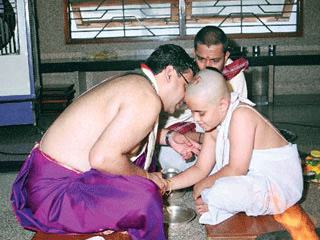 How does the system of stages of life help in attaining four pursuits?
How does the system of stages of life help in attaining four pursuits?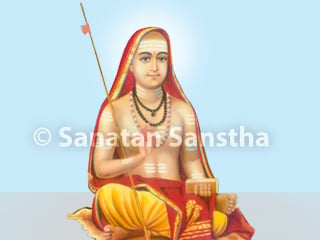 Why can't a renunciant stay in one place for more than three days?
Why can't a renunciant stay in one place for more than three days?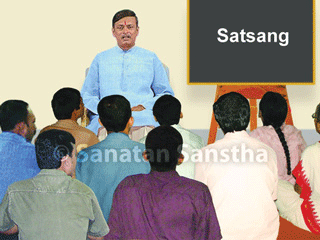 Why is humility a mandatory attribute for Brahman class?
Why is humility a mandatory attribute for Brahman class?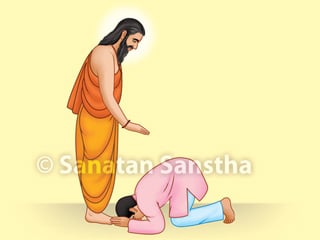 How is the 'class' (varna) of an individual determined?
How is the 'class' (varna) of an individual determined?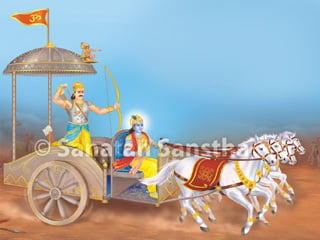 How did decline in righteousness cause creation of four classes?
How did decline in righteousness cause creation of four classes?